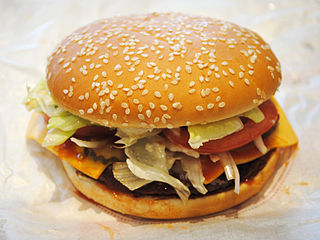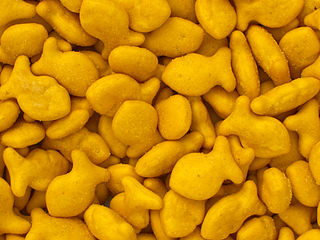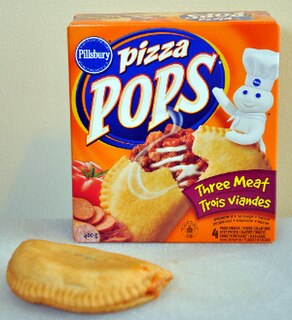Spam is a brand of canned cooked pork made by Hormel Foods Corporation. It was introduced by Hormel in 1937 and gained popularity worldwide after its use during World War II. By 2003, Spam was sold in 41 countries on six continents and trademarked in over 100 countries.

Hormel Foods Corporation is an American company founded in 1891 in Austin, Minnesota, by George A. Hormel as George A. Hormel & Company. Originally focusing on the packaging and selling of ham, Spam, sausage and other pork, chicken, beef and lamb products to consumers; by the 1980s, Hormel began offering a wider range of packaged and refrigerated foods. The company changed its name to Hormel Foods in 1993. Hormel serves 80 countries with brands such as Applegate, Columbus Craft Meats, Dinty Moore, Jennie-O, and Skippy.

A hot dog is a food consisting of a grilled or steamed sausage served in the slit of a partially sliced bun. It can also refer to the sausage itself. The sausage used is a wiener or a frankfurter. The names of these sausages also commonly refer to their assembled dish. Hot dog preparation and condiments vary worldwide. Typical condiments include mustard, ketchup, mayonnaise, relish, and cheese sauce, and common garnishes include onions, sauerkraut, jalapeños, chili, grated cheese, coleslaw, bacon, and olives. Hot dog variants include the corn dog and pigs in a blanket. The hot dog's cultural traditions include the Nathan's Hot Dog Eating Contest and the Oscar Mayer Wienermobile.

Chili con carne, meaning "chili with meat", is a spicy stew containing chili peppers, meat, tomatoes and kidney beans. Other seasonings may include garlic, onions, and cumin. The dish originated in northern Mexico or southern Texas.
Planters Nut & Chocolate Company is an American snack food company now owned by Hormel. Planters is best known for its processed nuts and for the Mr. Peanut icon that symbolizes them. Mr. Peanut was created by grade schooler Antonio Gentile for a 1916 contest to design the company's brand icon. The design was modified by a commercial artist and has continued to change over the years.

The Whopper is the signature hamburger and an associated product line sold by international fast food restaurant chain Burger King and its Australian franchise Hungry Jack's. Introduced in 1957, the hamburger has undergone several reformulations such as portion resizing and bread changes. The hamburger is well known in the fast food industry, with Burger King billing itself as "the Home of the Whopper" in its advertising, signage, and in its concept store, the BK Whopper Bar. Due to its position in the marketplace, the Whopper has prompted Burger King's competitors to try to develop similar products designed to compete against it.

Chef Boyardee is an American brand of canned pasta products sold internationally by Conagra Brands. The company was founded by Italian immigrant Hector Boiardi in Milton, Pennsylvania, U.S., in 1928.

Goldfish are fish-shaped cheese crackers manufactured by Pepperidge Farm, which is a division of the Campbell Soup Company. The crackers have been available in several varieties and, since 1962, 40% of the crackers contain a small imprint of an eye and a smile. The brand's current marketing and product packaging incorporate this feature of the product: "The Snack That Smiles Back! Goldfish!", reinforced by Finn, the smiling mascot with sunglasses. The product is marketed as a "baked snack cracker" on the label with various flavors and varieties.

The Dodger Dog is a hot dog named after the Major League Baseball franchise that sells them. It is a 10 inch pork wiener wrapped in a steamed bun. The hot dog is sold at Dodger Stadium located in Los Angeles, California. According to the National Hot Dog and Sausage Council, the projected number of 2011 season hot dogs sold at Dodger Stadium was 2 million—establishing Farmer John Dodger Dogs as the leader in hot dog sales of all those sold in Major League Baseball ballparks.

The Koegel Meat Company is a meat processing, packaging, and distribution company based in Flint, Michigan. Koegel's produces 35 products. Koegel's hot dogs are considered by the authors of "Coney Detroit" as the best hot dog for a Flint-Style Coney Dog along with Abbott's Meat's coney sauce. Koegel is also a supplier of A&W, about 200 Coney restaurants, Walmart, Dairy Queen and Kroger. Distribution of its own products to each store gives Koegel an advantage of being able to give a shorter shelf life, at half its competitors, to ensure a fresh product.

Stuffed crust pizza is pizza with cheese or other ingredients added into the outer edge of the crust. The stuffed crust pizza was popularized by Pizza Hut, which debuted this style of pizza in 1995.

A Coney Island hot dog is a hot dog in a bun topped with a savory meat sauce and sometimes other toppings. It is often offered as part of a menu of classic American "diner" dishes and often at Coney Island restaurants. It is largely a phenomenon related to immigration from Greece and North Macedonia to the United States in the early 20th century.

This is a listing of regional variations on the hot dog. Different areas of the world have local variations on the type of meat used, condiments, and means of preparation, which are enumerated below.

Pizza Pops are a Canadian calzone-type snack produced by Pillsbury brand of General Mills. Pizza Pops are sold pre-cooked and frozen. Typically, they are reheated in a microwave oven. However, they may also be cooked in a conventional oven. They were invented by Paul Faraci of Winnipeg, Manitoba, Canada in 1964; they were conceived as a modification of traditional cheese-filled Italian turnovers such as calzone or panzerotti, and created a snack staple in Canada that delivers a hand-held calzone, and supplies a quick pizza "fix." The rights to the pizza pop were later sold to Pillsbury. Pizza Pops are currently manufactured by General Mills at a factory in Winnipeg.

A cheese dog is a hot dog served with cheese or processed cheese on it or stuffed within it, as a filling.

RPA is a full-service American advertising and marketing agency headquartered in Santa Monica, California. It was founded in 1986 by Gerry Rubin and Larry Postaer and currently employs more than 700 associates. The agency has regional offices in Portland, Denver, Dallas, Chicago, Atlanta, Boston and Moorestown, New Jersey.
In 1990, Tyson Foods launched a line of Tyson Looney Tunes Meals. They were based on cartoon characters licensed from Warner Brothers and marketed aggressively toward children. The meals were taken off the market in late 1993, because of declining sales due to the Early 1990s recession.













